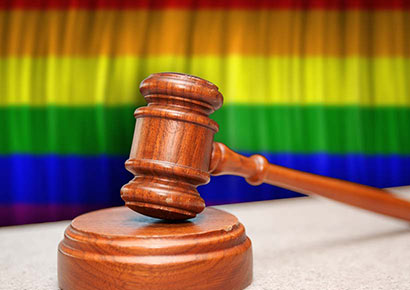US Supreme court sends back anti-gay florist case
 In the wake of its recent ruling in favour of a homophobic baker, the US Supreme Court has declined to look at a case concerning a florist who also refused to serve a same-sex couple.
In the wake of its recent ruling in favour of a homophobic baker, the US Supreme Court has declined to look at a case concerning a florist who also refused to serve a same-sex couple.
In 2013, Curt Freed and Robert Ingersoll were denied service by the flower shop, Arlene’s Flowers, while planning their wedding, because of the owner’s religious beliefs.
Last year, the Washington State Supreme Court ruled in favor of the men, who are represented by the American Civil Liberties Union (ACLU). It found that the store’s owner, Barronelle Stutzman, violated the state’s anti-discrimination law. She was fined $1000 and ordered to provide equal services to all couples, but the case was appealed.
On Monday, however, the US Supreme Court said it would not take up the matter and instead sent it back to the Washington State Supreme Court. It ordered the lower court to re-look at the case in light of the US Supreme Court’s ruling earlier this month in favour of the Colorado baker who refused to bake a gay wedding cake.
In that ruling, the US Supreme Court found that the Colorado Civil Rights Commission has shown religious bias in its proceedings against Jack Phillips, owner of Masterpiece Cakeshop, when it found him guilty of discrimination.
The court’s decision did not address whether Phillips was entitled to discriminate against same-sex couples, but simply looked at the procedures of the Colorado commission. The lower court has now been asked to see if there was similar bias in the Washington florist case.
“To be clear, the court made no indication the lower courts ruled incorrectly and made no decision on the case’s merits,” said James Esseks, Director of ACLU’s LGBT and HIV Project, about Arlene’s Flowers. “We are confident that the Washington State Supreme Court will rule once again in favor of the same-sex couple, and reaffirm its decision that no business has a right to discriminate.”
HRC Legal Director Sarah Warbelow agreed that the Supreme Court “did not indicate there was anything wrong with the [original] ruling.” She explained that in the Masterpiece case, “the Supreme Court found that the state of Colorado’s enforcement of its civil rights law was flawed due to perceived bias in the process, however, there is no indication that there were flaws in the application of civil rights law in Arlene’s Flowers.”
Robert Ingersoll, one of the men discriminated against by the florist, commented: “No one should have to experience the hurt that we did. Curt and I now live our lives on-guard in a way that we didn’t before we were turned away from Arlene’s Flowers. No one should have to experience that, and we’re hopeful the Washington courts will again recognise that this case is clearly about discrimination, which has no place in the public marketplace or in our constitution.”
The US Supreme Court has thus far refused to conclusively rule on whether businesses should be allowed to discriminate against customers because of an owner’s religious beliefs. Washington is one of 20 US states that provide protections against discrimination in employment, housing, and public accommodations on the basis of both sexual orientation and gender identity.
Leave a Reply